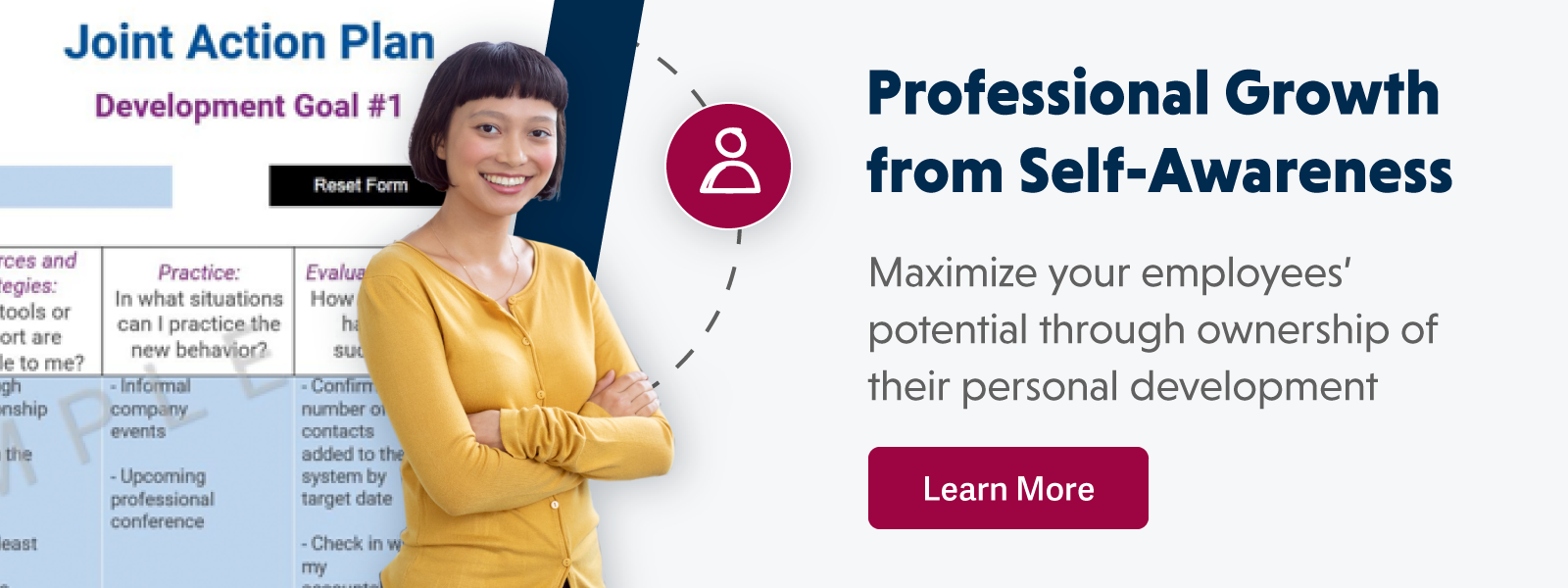In a previous blog post, we described how self-management is a critical skill for high-performing individuals who are engaged and motivated. If this isn’t happening naturally, how do you achieve this? A good way to steer this type of performance begins with proper coaching. Coaching through real-time conversations versus scheduled annual performance reviews helps create an open dialogue that discusses issues, successes, progress, and roadblocks through conversations that help build confidence and call attention to matters that need extra care. Once your employees feel comfortable with these conversations and feel as though they have the tools and skills needed to increase their autonomy, the Caliper Individual Developmental Guide helps employees take control of their own development today and for the future. Over the next few months, we’re going to take a deeper dive into the 6 components that improve self-management and how to bolster those traits in your employees to help them steer their own professional development.
Composure
Composure is the state of feeling calm and in control. In the workplace, this might refer to both an employee’s workload — not getting in over their head through proper organization and time management — or remaining in control of their emotions when things get stressful or overwhelming. Operating with composure means employees are more likely to tackle issues head-on, think clearly, resolve conflicts quickly, make sound decisions, and demonstrate coolness to their teammates. Those with self-management can identify stressors and address them, knowing that reacting emotionally might lead to additional conflict or miscommunication. Employees who can self-manage think about future consequences and act accordingly to ease any tension they might anticipate.
What are the key traits to successful #SelfManagement? @CaliperCorp has the answer in this new 3-part series: Share on XSo how do you coach this in someone who is struggling with maintaining composure?
- Lead by example. Attitudes are often contagious. By demonstrating an even-keeled response to emotional or stressful situations, you will be able to set the tone for others around to respond in kind. Employees tend to mimic the mannerisms and communication styles of their managers, so setting a good example is an easy way to coach composure in your team. If someone is getting overwhelmed, take them aside to work through their issues in a private setting, before they react emotionally.
- Teach flexibility. Stubbornness can lead to stress. If an individual believes they hold the correct stance on an issue or understand the solution to a problem, encourage them to accept ideas from others and examine other points of view before they dig in their heels. There is often more than one answer, and it’s important to consider all the options before making a firm decision. By teaching flexibility, you’re promoting clear communication, critical thinking, collaboration, and creativity. Your stubborn employee might even learn a new, better way to do things.
- Acknowledge composure when you see it. Let your employees know when you notice them keeping their cool in times of stress. Praise them for handling the situation with poise, and call out what they did well at the moment so they remember it the next time they feel their patience being tested. Conversely, if you see them reacting emotionally, coach them on how to keep their cool.
- Stay positive. Always approach these coachable moments with grace and dignity. Never speak down to an employee who’s reacting emotionally — sometimes it’s for good reason. Talk through stressful situations and discuss what you can do to help them through, and what they can learn from this situation. Everything is a learning opportunity.
Self-Awareness
Self-Awareness is the conscious knowledge of one’s own character, feelings, motives, and desires. It’s the consideration of the way you’re perceived by the people around you. Though they might be a perfectly competent employee, someone without self-awareness might make off-hand comments that offend, interrupt others while they’re working, or misunderstand their own workstyle or preferences without realizing it.. A self-aware employee monitors reactions and considers how their words, actions, and work affect everyone else. Without such awareness, they may inadvertently make more work for others or lack credibility when trying to suggest opportunities for improvements in process or structure.
Ever wondered how to be more successful at coaching #SelfManagement in your employees? @CaliperCorp breaks down how in this new 3-part series: Share on XHere are a few ways to help encourage reflection in someone who seems to lack self-awareness:
- Help them get to know themselves better. Personality assessments allow individuals and their managers to gather insights on personality and work-specific competencies. These help individuals better understand their proficiencies and deficiencies; it helps them identify opportunities for growth in areas they may not have considered.
- Allow them space to reflect. Schedule regular time with them to talk about their week, their work, and their interpersonal relationships. Take this time to think about the tasks and interactions that went well or could have been better, why each turned out that way, and how to use that knowledge moving forward.
- Encourage mindfulness. Recently, researchers have noticed a link between mindfulness and emotional intelligence. High emotional intelligence helps build attention and focus; both of which increase self-awareness and empathy. Encourage them to take a meditation break, sign up for that yoga class your company offers, or take a walk on their lunch hour. Encourage them to take a moment during the day when they can check in with themselves.
High-performers who are excellent self-managers exhibit these traits and more. Next, we explore why adaptability and professionalism are also critical skills for exceptional self-management. To learn more about the Individual Developmental Guide and how it helps encourage your employees to self-manage, reach out to our experts to learn more.


